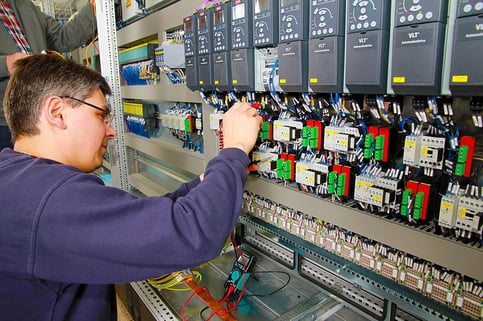Electrical control panels are the collection of electrical devices that control the functioning of different industrial equipment using electrical power. These panels help keep orderly control on industrial equipment to ensure that it achieves multiple mechanical goals. It is a closed metal box that has two main components: the panel structure and the electrical components. Let’s take a closer look into what an industrial control panel is, as well as its many benefits.
Inside an Electrical Control Panel
Panel Structure: The panel structure of an electrical control panel is a metal box with a back panel that looks similar to a breaker box. There is an enclosure with one or two doors, depending on its size, made of metals like steel or aluminum. These boxes pass stringent quality checks. Moreover, they come with the UL safety rating to ensure that it is explosion-proof, contamination-proof, waterproof, and safe for indoor and outdoor use. Furthermore, it also has a panel mounted at the back of the metal box, which supports the wire ducts.
Electrical components: There can be multiple electrical components present in an industrial control panel, depending on the functions it has to perform.
Electrical control panels usually have:
- Main circuit breaker, where all the power comes in the control panel. There is a switch outside for this circuit breaker to disconnect the power whenever necessary.
- Transformer, which switches the power down to give enough supply to the smaller devices.
- Terminal blocks that join the two power lines together.
You can also find programmable logic controllers (PLCs), contactors, network switches, and various other components that enable the electrical control panel to function well.
 Benefits of an Electrical Control Panel
Benefits of an Electrical Control Panel
- These panels are essential for industrial automation as they constantly monitor different industrial controls. This way, they help experts control and organize production objectives.
- Industries can get the panels custom-made to their requirements. They can opt for a simple relay system, or a much more complex industrial control panel, for cohesive control of mechanical aspects of their machinery and different industrial equipment.
- They offer enhanced reliability by constantly monitoring equipment and providing experts with data every minute.
- The panels are capable of handling complex electric controls. If you hire an expert team to design these panels as per the necessary requirements, they can manage the most complex industrial setup.
- These panels are weatherproof, which means you can place them both indoors and outdoors as they won’t rust or get damaged with changing weather conditions.
- Electrical control panels are hazard-proof, ensuring no risk of electrical shocks or fire outbreaks (it is safe to work in and around the panels).
- These days, many companies provide “aesthetically pleasing” industrial control panels. As such, these panels do not interrupt the “beauty” of buildings.
- Electrical control panels simplify the process for industrial experts. With the controls provided on a panel, experts can design and organize the process control of different machines and operations.
- With increased efficiency, industries can expect a reduction in their overall processing cost.
- As experts can control the mechanical processes, there is little chance of any flaw or process giving an undesired outcome.
Electrical control panels are an essential part of many industries, including food and beverage, manufacturing, oil and gas, agriculture, and more. To start this process, get in touch with a leading manufacturer of industrial control panels to receive the necessary technology that meets all of your needs and expectations.




